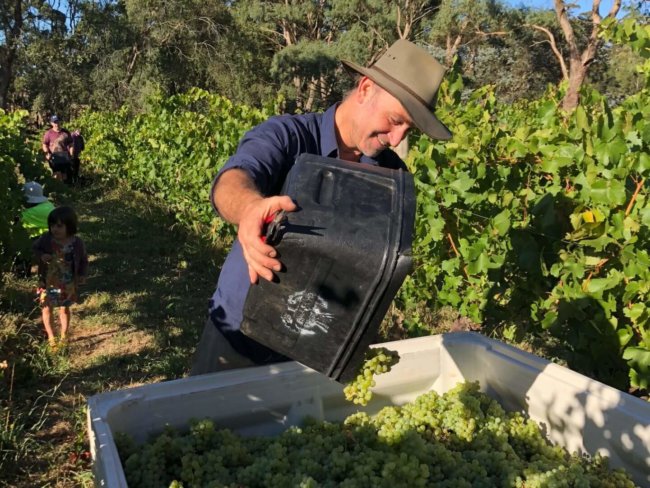Almost 20 years old now, Erinn and Janet Klein’s Ngeringa is a true Adelaide Hills pioneer. The pair were growing certified biodynamic fruit, fussing with it little in the winery and employing minimal sulphur right from their first viable crop. They were ‘natural’ well before many early adopters had vines of their own, yet alone started the laborious organic or biodynamic certification process. But their wines didn’t pull the rug from under wine drinkers’ expectations like some did, rather they debuted with syrah, pinot noir and chardonnay that were unique for how and where they were grown, with winemaking slipping well into the background. Erinn and Janet were Young Gun finalists in 2010.
While Erinn Klein didn’t necessarily get the head start in wine that some of his South Australian contemporaries did (he wasn’t the next incumbent of a winemaking dynasty, nor did he grow up on a vineyard), he inherited some farming expertise that put him in a rare position.
Klein’s parents are Ulrike and Jürgen Klein, who founded the Jurlique skin-care brand in 1985. In the 90s, they bought a property in the Adelaide Hills to establish what has become an internationally regarded herb farm, providing material for Jurlique’s botanical extracts.
That farm was managed using biodynamic principles long before Erinn and his wife Janet settled there, and it was certified biodynamic way back in 1993. Erinn and Janet first planted vines in 2001, with the first wine from those vines released from the 2005 vintage (though the Ngeringa brand was used for a release from McLaren Vale a year prior). They now farm three vineyards on the property across about two hectares around Nairne and Mount Barker.
![]()
Janet Klein.
Ngeringa is more than a vineyard, though. There’s a full-time gardener tending to the commercial biodynamic gardens, with fruit and vegetables sold to top restaurants locally and in Adelaide, as well as in weekly produce boxes. They also have an olive grove for oil, and run Scottish highland cattle, sheep and chickens.
The Kleins have also invested heavily in returning what was clear-felled farmland back to something closer to its original state by planting up to 1,500 trees a year since 2008, all of which are original local species. It’s a deep process of returning the land to be in harmony with the vines and the gardens, with the aim of not just returning the native flora, but to ultimately encourage local fauna and provide a further haven in what is classed a biodiversity hotspot. The vineyard operations are also 80 per cent solar sufficient. It’s a holistic affair, that’s for sure.
In the winery, the Kleins have always had a gentle hand, eschewing any additions bar sulphur and working in a lo-fi manner. In fact, Ngeringa is a modern pioneer of the approach in this country, and one of the few attached to the ‘natural’ movement that has worked with biodynamic fruit from their own property from the beginning. While others were operating with a natural spirit, many were years off from actually ensuring their primary ingredient – the fruit – was genuinely organic.
The keynotes of those early releases were shiraz, a shiraz viognier, chardonnay, a straight viognier and a serious take on rosé – unusual for the time. Tempranillo, nebbiolo and sangiovese followed not long after. More recently, the Uncultured range has been added to the Ngeringa stable, capturing everything from more brightly forward wines to sulphur-free bottlings, a pét-nat, a naturally fermented cider and even their estate olive oil. With vine maturity, the Kleins are now also bottling single-site wines, forming their pinnacle offerings.





